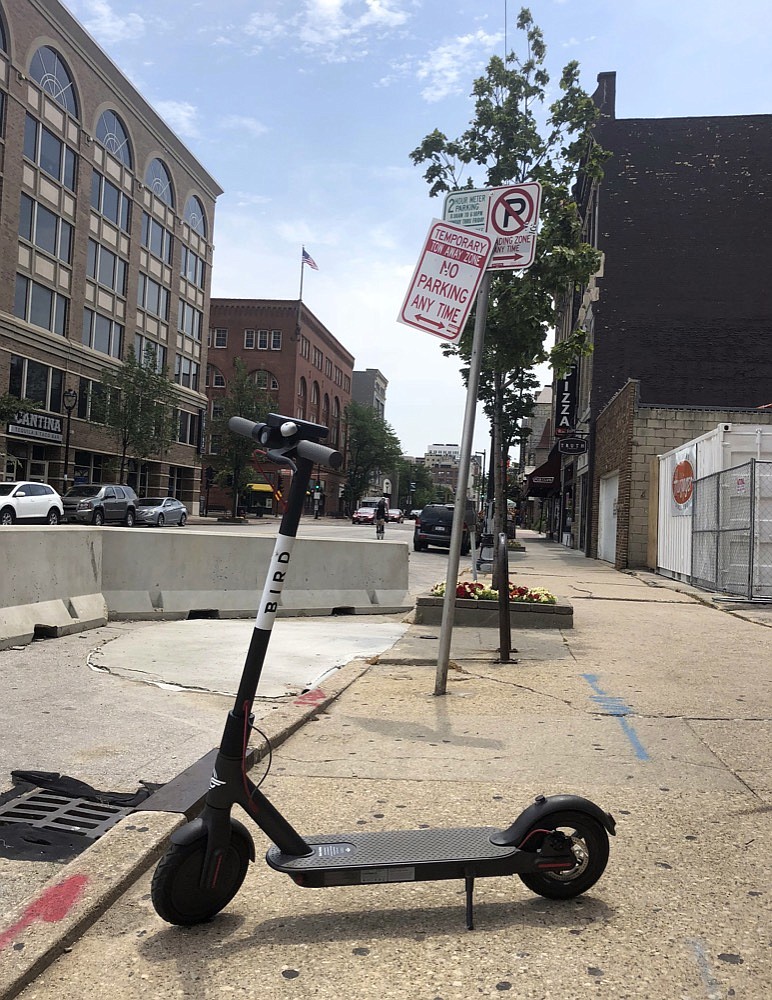Love them or loathe them, scooters are rolling toward Chattanooga.
The city council is hoping to be ready for them.
Council members on Tuesday discussed rules to regulate scooter companies before the electrically powered vehicles that look like kids' toys start showing up on local streets.
Chattanooga Department of Transportation Director Blythe Bailey told council members that "streets that are occupied by people are streets that are safe, healthy and comfortable to be on. We think these new options can prove a good thing for Chattanoogans."
He said a couple of scooter companies approached the city about setting rules in advance.
That hasn't happened in other places across the nation. In places as far away as Los Angeles and as close as Nashville, rental scooter companies have revved up business before city governments even knew they were there. Many municipalities have reported problems with dumped and junked vehicles, riders speeding along on sidewalks instead of streets and increased numbers of accidents.
Council Chairman Ken Smith said a quick Google search brought him dozens of references to problems that have led some cities to ban the vehicles.
Google "doesn't come up with how great these are, it comes up with how much of a nuisance these are," Smith said. "If other cities are passing ordinances to ban them, I would like to look twice before we pass an ordinance to allow them."
Bailey outlined the proposed rules, which include permit requirements, defined service areas, "robust" education for riders about safety and traffic rules, and other regulations, along with a $110-per-scooter annual fee.
But that didn't answer all council members' questions, including about whether the two-wheelers will cause more traffic congestion - Bailey said they shouldn't, because giving people transportation options could keep more cars off the road - and whether people could be cited or arrested for riding without a helmet or "scooting under the influence."
Chattanooga police Deputy Chief Eric Tucker said scooter drivers would have to obey the same traffic laws as bicyclists and automobile drivers. And Bailey added that liability will fall on the private companies operating the scooters.
The vehicles typically are dockless, so they can be parked anywhere and activated using a smartphone or credit card.
Bailey said they've proven popular in other cities and he's even used them himself while traveling. He said the fees are calculated to cover the increased police and administrative time needed to operate the program. And the companies have promised to collect data showing when and where the scooters travel, which the city can then use to gauge popular destinations. The data won't say anything about the people who rent the vehicles, he said.
It will likely be a few weeks before the scooter ordinance shows up on the council agenda for a vote.
Also on Tuesday:
* Council members were briefed on a proposed payment in lieu of taxes (PILOT) agreement with a company called Vitus, which is buying the Ridgeway apartments near College Hill Courts.
The Seattle-based company, which specializes in buying and operating low-income housing, will pay $6 million for the 198-unit complex. In return for a PILOT agreement that would forgo $374,000 in city property taxes over 10 years, Vitus has promised to invest $8 million to upgrade the apartments and maintain them for low-income residents with the help of federal tax credits.
"We get super excited when we can provide housing for low- to moderate-income folks," said Donna Williams, city economic development director.
* Members talked at length about a plan to boost use of city parks by devising a system to waive usage fees instead of having each individual waiver come to the council for a vote. Jonathan Susman with Outdoor Chattanooga said the plan was to start with Miller Park, but many council members want to include all city parks to benefit neighborhoods.
* The council voted in favor of a controversial rezoning on Shallowford Road at Murray Lane. The developer wants to put apartments there, and local homeowners came to the meeting to object. Councilman Darrin Ledford said he voted for the rezoning because the project was for fewer, and low-rise, apartments. He said that would protect the neighborhood from high-rise development later.
* Members also voted to award an $860,000 grant to ABC Weatherization to perform lead testing and remediation in low-income neighborhoods. Williams said the full contract is for three years and more than $2 million, and includes a commitment from the company to train and hire residents in those neighborhoods to do remediation work.
Contact staff writer Judy Walton at jwalton@timesfreepress.com or 423-757-6416.
